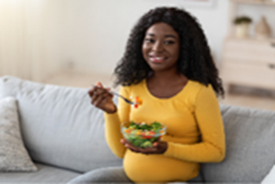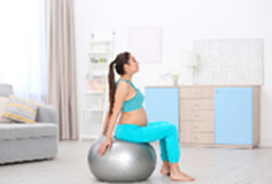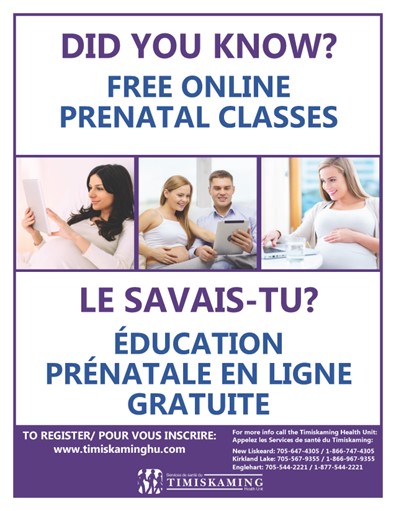Pregnancy.png)
On this page:
Nutrition During Pregnancy
Eating well during pregnancy
Eating well during pregnancy has many benefits for you and your baby, including:
- Getting the nutrients you and your baby need,
- Supporting the growth and development of your baby,
- Improving your energy and how you feel,
- Managing your blood sugars if needed.
Prenatal Supplements
Your body needs more nutrients during pregnancy to support you and the growth and development of your baby. Eating a wide variety of nutritious foods is an important step to getting the nutrients you and your baby need. While sometimes it can be difficult to get enough of certain nutrients from food, taking a prenatal supplement can help ensure that you are getting enough of all the nutrients you need in a day. When choosing a vitamin/mineral supplement to take during pregnancy, read the label and to make sure it includes 0.4 mg of folic acid and 16-20 mg of iron. Some women need even more folic acid and iron. Ask your health care provider about a vitamin/mineral supplement that is right for you.
Eating well and Pregnancy
Eating well before and during pregnancy is the first step in having a healthy baby. Your baby relies on the food you eat to help it grow and develop. Taking positive actions and building positive health habits by being more mindful of what you eat and drink during pregnancy will give your baby the best start, help you feel good about yourself and help you and your family develop a healthy relationship with food.
Tips for eating well during pregnancy:
- Refer to Canada’s Food Guide.
- Eat regularly throughout the day. Adding little more food than you normally would in the form of an extra snack or small meal will support you and your baby’s growth in the second and third trimesters. Try to include at least two food groups in a snack and three food groups if you’re having a small meal. Here are some examples.
- Include a variety of vegetables and fruit that are different colours. Aim for one dark green and one orange vegetable each day.
- Choose whole grain products, like whole grain crackers, breads, brown rice, pasta, or wraps more often.
- Include protein foods, like lean meats, eggs, milk, yoghurt, lentils, beans and chickpeas.
- Eat two food guide servings (150 grams) of low mercury, fatty fish per week. Examples are salmon, tilapia, sole, herring, trout and canned light tuna.
- Drink two cups (500mL) of milk or fortified soy beverage every day to help meet your calcium and vitamin D needs. Choose lower fat milk (skim, 1% or 2%), cheese and yogurt.
- Plan your meals and cook at home more often. Check out these money saving tips and recipes (Unlock Food).
- Drink water regularly to satisfy your thirst. Limit sugar sweetened beverages such as pop and juices. They are low in nutrients and high in sugar.
Foods to avoid or limit
There are certain foods that you should avoid or limit while you are pregnant to keep you and your baby safe.
- Liver: Contains very high amounts of vitamin A that can be harmful if eaten regularly. Limit the amount of liver you eat to 1 Food Guide serving per month, if at all.
- Caffeine: Too much caffeine isn’t good for you or your baby. Aim for no more than 300mg of caffeine per day. This is about one or two 250mL (8oz) cups of coffee. Other sources of caffeine include tea, cola, chocolate and energy drinks.
- Herbs and herbal tea: The safety of all herbs and herbal teas is not known. Some herbs can harm your baby. Health Canada states that the following herbal teas are generally considered safe in moderation (2 to 3 cups per day): citrus peel, ginger, orange peel, lemon balm, linden flower, rose hip. It is safest to avoid all other herbal teas that are not listed above. You can also talk to your health care provider about the safe use of herbal teas.
- Artificial sweeteners: Some artificial sweeteners are not safe during pregnancy. Foods that contain sweeteners are often low in nutrients and should not replace other more nutritious foods. For example, milk or water is a better choice than a sugar-free pop. A list of safe and unsafe artificial sweeteners can be found in the resource Healthy Eating for a Healthy Baby (Best Start Resource Centre).
- Fish high in mercury: Fish is healthy to eat during pregnancy, but some fish are high in mercury and should be limited. Some fish caught in local lakes may not be safe to eat either. Check out the guide to eating Ontario sport fish (Ministry of the Environment, Conservation & Parks) for more information on safe local fish.
- Foods that increase your risk of food poisoning: Avoid eating:
- Raw fish including sushi and shellfish such as oysters and clams
- Raw sprouts, especially alfalfa sprouts
- Raw or undercooked meat, poultry, seafood and hot dogs
- All foods made with raw or lightly cooked eggs
- Patés, some deli meats and smoked fish products
- Unpasteurized milk products and goods made from them
- Soft and semi-soft cheese such as brie, camembert, feta and blue-veined cheese (pasteurized and unpasteurized)
- Unpasteurized juices such as unpasteurized apple cider
For more information on safe food choices and food handling tips check out the resource safe food handling for pregnant women (Healthy Canadians).
Weight gain
Every woman is different. The recommended amount of weight you should gain depends on how much you weighed before you became pregnant. Most of your weight gain will happen during your second and third trimester. Your health care provider will probably weigh you at your appointments. Talk to them about how much weight gain is right for you.
Remember: Weight gain is a natural and normal part of pregnancy. Embrace it and know you are doing your part to grow a healthy baby. Have a healthy pregnancy by avoiding smoking and alcohol, by being active, eating well, and by feeling good about yourself and your body!
For more information, visit Prenatal Health and Your Baby.
Sleep During Pregnancy
It is common to feel more tired and experience changes in your sleeping patterns during pregnancy. Getting enough sleep can be beneficial for a healthy pregnancy. As is recommended for most adults, aim for 7 to 9 hours of quality sleep each night.
Source: 24 Hour Movement Guideline
For more tips, visit our page on Sleep.
You can also check out Your Guide to a Healthy Pregnancy and search “sleep”.
Physical Activity During Pregnancy 
Is it safe for me to engage in physical activity during my pregnancy?
In general, most people can engage in physical activity during pregnancy. Unless otherwise indicated by your health care provider, staying physically active during pregnancy is encouraged. It’s recommended that pregnant people get at least 150 minutes of moderate intensity physical activity per week. If you’ve never really been active, it’s never too late to start; just consult with your health care provider and start slowly. Likewise, if you have a medical condition or concerns about participating in physical activity, consult with your primary care provider for guidance.
For more information, visit:
Mental Health During Pregnancy
“Perinatal mental health” is the emotional health and wellbeing during pregnancy and the first year after childbirth.
Pregnancy, birth and early parenthood can be times of great joy, but they can also be times of tremendous change and stress.
Taking care of your mental health is important because it allows you to develop a secure attachment with your baby, helps build your resilience to cope with stress and helps you reach your potential as an individual, parent and caregiver.
Eating healthy and being active are not only good for your physical health, but for your mental health as well. Coping with stress and challenges and having a support system are some other ways that can help promote positive mental health in pregnancy and after birth.
Stress can be a healthy and normal part of life, but too much stress can be overwhelming and lead to poor mental health and increase the risk of perinatal mental illness.
- Talk to your partner, or someone you are close to and trust about how you are feeling and thinking. It is good to have someone who supports, listens and encourages you.
- Challenge negative thoughts as they affect how you see yourself, how you parent, and care for and relate to your baby.
- Remember it is ok to say no and not take on more than you can handle. Take time to recover from childbirth and take care of yourself and baby.
- Ask for help when you need it.
Having a support system can help promote connection, reduce stress and feelings of loneliness.
- Connect with those you trust to give you positive emotional and practical support. Let them care for your baby while you catch up on sleep, have a shower or enjoy a warm meal.
- Explore places to make social connections and friendships such as friendship centres, churches, multicultural groups, yoga classes or connecting with a local EarlyON Child and Family Centre.
It is common to feel many different emotions during pregnancy. Perinatal mood and anxiety disorder (PMAD) can be experienced by both mothers and fathers. Have a look at the Pregnancy and life with a new baby are not always what you expect sheet to learn more about how PMAD may present themselves. If you or someone you know is struggling after the birth of a new baby, please call the Timiskaming Health Unit 705-647-4305 or toll free 1-866-747-4305 and ask to speak to a HBHC nurse. If you are in crisis, call or text 9-8-8 to reach the Suicide Crisis Helpline.
Other supports:
Quitting Smoking During Pregnancy
Quitting or smoking less before and during pregnancy can help increase the chance of a safe pregnancy and improve health outcomes for your baby and as they grow up.
Although the aerosol of e-cigarettes/vapes generally has fewer harmful substances than cigarette smoke, vapor and other products containing nicotine are not safe to use during pregnancy.
As often as possible, avoid second-hand smoke by making sure your home and car are smoke-free environments.
How can I quit smoking?
- Set a date to quit and a decide on a plan (e.g., nicotine replacement therapy, attend a group).
- Ask family, friends and roommates for support and understanding.
- Throw out your cigarettes, lighters, matches and ashtrays.
- Get rid of reminders of tobacco in your home, office and car.
- Be aware of your smoking triggers and plan ahead for ways to cope.
- Practise new ways to handle stress.
- Stock up on sugarless gum, hard candies and carrot sticks.
It takes planning and effort to quit smoking. The sooner you quit, the better.
You can increase your chances of quitting with help from Smokers Helpline (1-877-513-5333 or smokershelpline.ca), Pregnets (pregnets.org) or check out STOP on the Net (nicotinedependenceclinic.com/en/stop).
Visit our Quitting Smoking page for more information and resources.
Visit Prenatal Health and Your Baby for more information about smoking and other substance use.
Immunizations During Pregnancy 
Do I need to get my vaccines updated?
Immunization protects against diseases that can cause harm. It is important to talk to your health care provider or a public health nurse to find out if you require any vaccinations during your pregnancy.
All pregnant people, regardless of vaccination history, should receive the Tdap vaccine between 27 and 32 weeks gestation in each pregnancy. The Tdap vaccine protects against tetanus, diphtheria, and pertussis. Pregnant people should also get a flu shot during flu season. The COVID-19 vaccine is also recommended for pregnant people who don’t have contraindications. For more information about pregnancy and the COVID-19 vaccine click here or discuss with your primary care provider or a public health nurse.
For more information:
Services at THU
Pregnancy, prenatal care and your health
Timiskaming Health Unit has a number of resources available to provide you with helpful & up to date information about pregnancy and how to care for a newborn.
Services we offer for families expecting a baby:
These classes help prepare expecting parents in feeling more confident about labor and delivery. The topics covered aim to help you feel prepared for the upcoming months. Classes are for expectant parents and their partner/ support person and are available online. Contact an HBHC nurse to get more information.
Healthy Babies Healthy Children (HBHC) offers a free home visiting program that supports pregnant people and families with children 0-6 years of age. The service is provided by a Public Health Nurse (PHN) and a Family Resource Worker (FRW). Together with the family, they work on goals, such as pregnancy and birth, positive parenting, healthy relationships, bonding with your child, growth and development, breastfeeding, and so much more. The PHN and FRW also help families connect with other services and programs in the community.
Trained Child Passenger Safety Technicians ensure your child’s car seat is installed properly before you’re ready to bring baby home or as your child grows. Parents, grandparents and caregivers are all welcome to book an appointment!
To sign up or learn more, contact us to speak to a Healthy Babies Healthy Children (HBHC) nurse. All services are free and by appointment.
Prenatal Classes
Pregnancy is a very special time.
If you and your partner are expecting, it is easy to feel overwhelmed by fear of the unknown. Studies have shown that being educated in the birth process can reduce the amount of stress in labour. When you understand the labour process, it is easier to allow your body to do what it needs to do. Many new parents find that education through prenatal classes, or an online childbirth class can really help calm their worries and answer many questions. The
The Timiskaming Health Unit offers free prenatal education for couples, singles and teens in two ways:
1. Prenatal Classes
In-person prenatal classes are being offered in New Liskeard and Kirkland Lake. If you live outside these communities, please contact us to find out what options are available to you.
Prenatal class dates are as follows.
2025:
Kirkland Lake:
September 2-9-16-24
New Liskeard:
September 3-10-17-24
Classes are also being offered virtually in partnership with Temiskaming Brighter Futures. For details about when these are running, contact us or check out either Temiskaming Brighter Futures or Timiskaming Health Unit on Facebook.
2. Online Childbirth Education 
Who should take an Online Childbirth Education Class?
This online class may be the answer if... you find yourselves in one of the following situations:
- Time Constraints - Perhaps you and your partner have limited time because of other commitments or activities.
- Bed Rest - Your healthcare provider may have placed you on bed rest for medical reasons and therefore you cannot attend classes.
- Timiskaming Health Unit Face-to-Face Classes are Full - Perhaps you have waited too long to register for classes and there is nothing available.
- Have Given Birth Before - It is always helpful to have a "refresher course".
How does it work?
This program is offered in partnership with Public Health Sudbury & Districts. To register, click here! Should you require local services you can contact our offices, please call 1-866-747-4305.
Pick up your bag of Prenatal Resources at your local Health Unit office!
20250828/br:tr